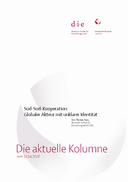
Süd-Süd-Kooperation: Globaler Akteur mit unklarer Identität
Fues, Thomas (2016)
Die aktuelle Kolumne, 11. April 2016
Im März 2016 veranstaltete Indien in New Delhi die zweite globale Konferenz für Süd-Süd-Kooperation (SSC). Aufstrebende Mächte im Süden wie Brasilien, China, Indonesien, Indien, Mexiko und Südafrika sind jetzt bereit, sich aktiv in kollektive Bemühungen für die internationalen Nachhaltigkeitsziele, die Addis-Agenda zur Entwicklungsfinanzierung und für den Pariser Klimavertrag einzubringen.